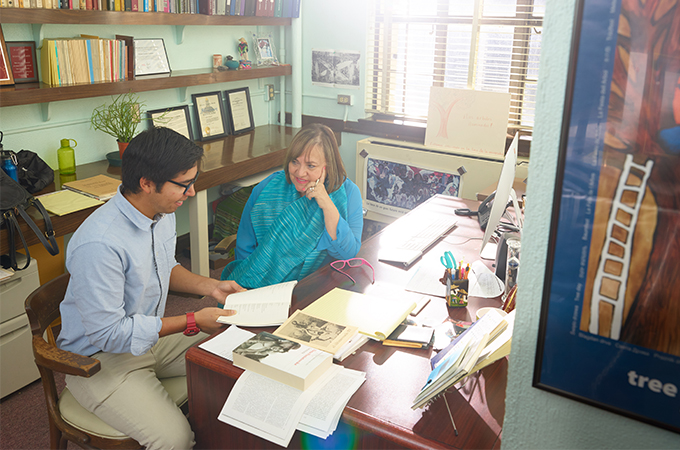Award-winning poet and University of Redlands Professor of Latin American Literature Ivonne Gordon-Vailakis recently published her tenth book of poetry, titled Diosas Prestadas/Borrowed Goddesses (Madrid: Torremozas, 2019). A volume of poetry, the book reexamines Greek mythology from the perspective of the goddesses. Katie Olson of the Bulldog Blog sat down with Gordon-Vailakis to talk about the book’s inspiration and how authorship contributes to her academic life.
Bulldog Blog: Tell me about your latest book.
Ivonne Gordon-Vailakis: The book is titled Diosas Prestadas/Borrowed Goddesses. I wanted to provide a more modern and contemporary account of Greek mythology by allowing the goddesses to speak more, because, usually, the gods are the ones who are talking. It’s really about the priority of voices. It’s a bold attempt to rewrite mythology from a different perspective.
The book is written in the poetic voice because I find that to be the most universal. I’ve been traveling to Greece to conduct research for the book over the last six years. During my research trips, I went to many of the places where the myths were created, which was both amazing and necessary. I worked on an island and wrote every day.
BB: How did you decide to write Diosas Prestadas/Borrowed Goddesses?
Gordon-Vailakis: There is a book titled The White Goddess by Robert Graves that offers a different perspective on Greek mythology by exploring the historical grammar of poetic myth. That book really stayed with me after I read it, and I thought that Graves’ approach to mythology was interesting. I realized I wanted to write about mythology from the female perspective and, when I started writing, it just became necessary.
BB: What is the most rewarding aspect of publishing your work? How do your students respond?
Gordon-Vailakis: I enjoy being able to share my perspective. I recently had a reading for Diosas Prestadas on campus, which had a huge turnout of alumni, students, faculty, and members of my department. The room was completely full, and it was really exciting. Writing is a solitary act, so it was great to introduce my book to an audience of people I know and appreciate. It also provided students with an opportunity to see me in a different light.
Students gravitate toward my published work, and I involve them in my writing process. I teach a poetry class during May Term that includes an opportunity for students to translate my poems. Some of my students read my poems during reading events. I like to think that students feel as though they’re a part of my writing and publishing process.
BB: How does publishing work on a regular basis enhance your academic career?
Gordon-Vailakis: As professors, our creative and scholarly work make us more complete. I also bring my writing to class, and it becomes real—it’s no longer so abstract. Students are appreciative of these additional perspectives on writing, and that’s the whole mission of education—to open peoples’ eyes and hearts to become whole human beings.
BB: Do you have any plans to work on something new?
Gordon-Vailakis: Of course. I always have many books on the shelf to be worked on. I have another project in the works, but I’ve published something each year for the past three years. I want to take a short break. But I’ll have something new to share in a year and a half or so.
BB: Where can readers purchase Diosas Prestadas/Borrowed Goddesses?
Gordon-Vailakis: The book is available at the University Bookstore and through the publisher’s website.
Learn more about creative writing or Latin American studies at the University of Redlands.






